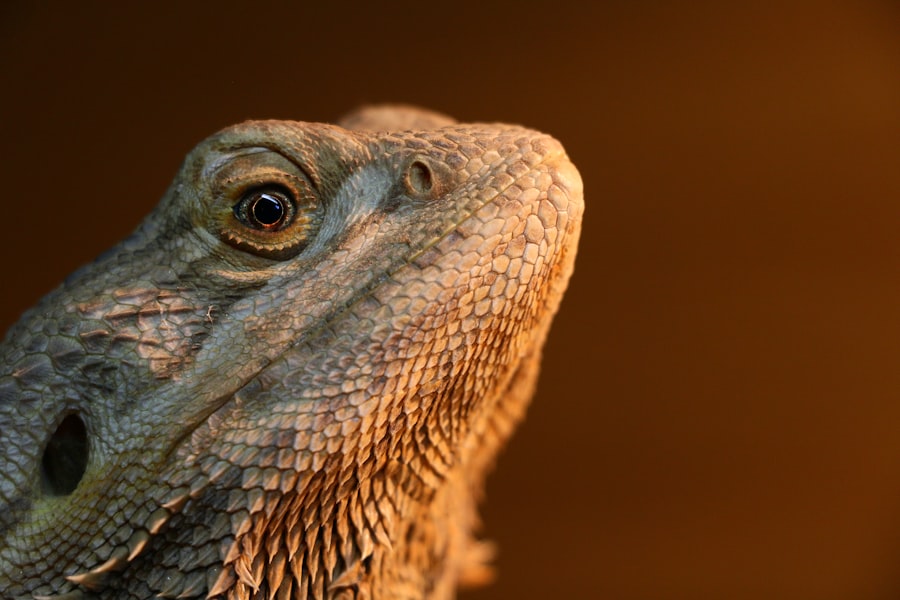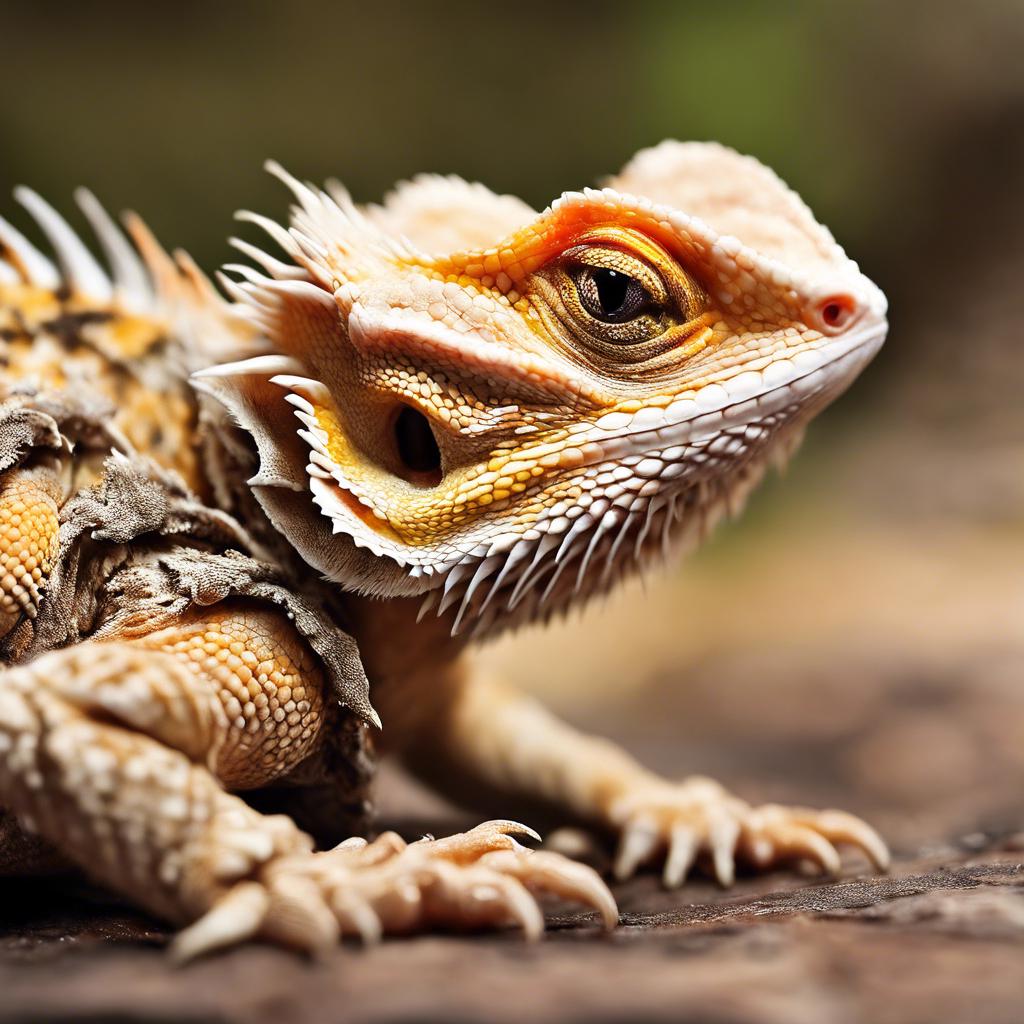Proper nutrition is crucial for the health and development of baby bearded dragons. These small reptiles have specific dietary needs that must be met in order for them to grow into healthy adults. Feeding baby bearded dragons is different from feeding adult bearded dragons because their nutritional requirements are different. Baby bearded dragons need a balanced diet that provides them with the necessary nutrients to support their growth and development.
Key Takeaways
- Baby bearded dragons require a balanced and nutritious diet for healthy growth and development.
- Commercial baby food options for bearded dragons are available, but homemade baby food recipes can also be used.
- A feeding schedule should be established for baby bearded dragons, with small and frequent meals throughout the day.
- When introducing solid food to baby bearded dragons, it is important to start with small pieces and monitor their response.
- Signs of malnutrition in baby bearded dragons include lethargy, weight loss, and stunted growth.
Nutritional requirements of baby bearded dragons
Baby bearded dragons require a diet that is high in protein, calcium, and vitamins. Protein is essential for their growth and muscle development, while calcium is necessary for the formation of strong bones and teeth. Vitamins, such as vitamin D3, are important for their overall health and immune system function. A balanced diet that includes a variety of foods is crucial for their health.
Types of baby food for bearded dragons
There are several types of food that baby bearded dragons can eat. These include live insects, such as crickets and mealworms, as well as vegetables and fruits. It is important to provide a variety of foods to ensure that they are getting all the necessary nutrients. Insects should be gut-loaded before feeding them to the baby bearded dragons to ensure that they are getting the proper nutrition.
Commercial baby food options for bearded dragons
There are several commercial baby food options available for bearded dragons. These include powdered diets that can be mixed with water to create a nutritious meal for the baby dragons. Some of the best commercial baby food options include Repashy Grub Pie, Zoo Med Natural Bearded Dragon Food, and Fluker's Buffet Blend Juvenile Bearded Dragon Formula. These commercial options provide a balanced diet and are convenient for owners.
However, there are also some drawbacks to using commercial baby food. Some owners may find it expensive to continuously purchase commercial baby food. Additionally, some baby bearded dragons may not take to the taste or texture of commercial baby food, making it difficult to ensure that they are getting the proper nutrition.
Homemade baby food recipes for bearded dragons
Making your own baby food for bearded dragons can be a good option for owners who want more control over their pet's diet. There are several easy and nutritious homemade baby food recipes that can be made for baby bearded dragons. These include pureed vegetables, such as squash and sweet potatoes, as well as mashed fruits like bananas and berries. It is important to ensure that the homemade baby food provides a balanced diet and includes all the necessary nutrients.
Feeding schedule for baby bearded dragons

Baby bearded dragons should be fed multiple times a day to support their growth and development. They should be fed small meals throughout the day, with a focus on providing a variety of foods. As they grow, their feeding schedule will change. It is important to monitor their growth and adjust their feeding schedule accordingly.
Tips for introducing solid food to baby bearded dragons
When transitioning baby bearded dragons from a liquid diet to solid food, it is important to do so gradually. Start by offering small pieces of soft vegetables or fruits alongside their liquid diet. As they become more comfortable with solid food, gradually increase the amount and variety of solid foods offered. Monitor their progress and adjust their diet accordingly.
Common mistakes to avoid when feeding baby bearded dragons
There are some common mistakes that new bearded dragon owners make when feeding their babies. One common mistake is overfeeding, which can lead to obesity and other health issues. It is important to feed them appropriate portion sizes based on their age and size. Another common mistake is not providing a balanced diet. It is important to offer a variety of foods to ensure that they are getting all the necessary nutrients.
Signs of malnutrition in baby bearded dragons
It is important to be aware of the signs of malnutrition in baby bearded dragons. Some signs include stunted growth, soft or deformed bones, lethargy, and poor appetite. If you notice any of these signs, it is important to consult a veterinarian to ensure that your baby bearded dragon is getting the proper nutrition.
Ensuring a healthy diet for your baby bearded dragon
In conclusion, proper nutrition is crucial for the health and development of baby bearded dragons. Feeding them a balanced diet that includes a variety of foods is important to ensure that they are getting all the necessary nutrients. There are several commercial baby food options available, as well as homemade baby food recipes that can be made for baby bearded dragons. It is important to monitor their growth and adjust their feeding schedule and diet accordingly. By providing them with a healthy diet, you can ensure that your baby bearded dragon grows into a healthy and happy adult.
If you're looking for more information on feeding your bearded dragon, you might be interested in this article on Reptile Wizard's website: “Can Bearded Dragons Eat Black Olives?” This article explores whether black olives are a safe and nutritious option for your pet reptile. To learn more about this topic, click here. For their privacy policy, you can find it here, and to know more about Reptile Wizard, click here.
FAQs
What is baby food for bearded dragon?
Baby food for bearded dragon is a specially formulated food that is designed to meet the nutritional needs of young bearded dragons. It is made up of a variety of ingredients, including vegetables, fruits, and protein sources, and is typically available in a soft, pureed form.
Why do bearded dragons need baby food?
Bearded dragons need baby food because they have specific nutritional requirements that must be met in order for them to grow and develop properly. Baby food is designed to provide these essential nutrients in a form that is easy for young bearded dragons to digest and absorb.
What are the benefits of feeding baby food to bearded dragons?
Feeding baby food to bearded dragons can provide a number of benefits, including ensuring that they receive all of the necessary nutrients for healthy growth and development, promoting good digestive health, and helping to prevent nutritional deficiencies.
What ingredients are typically found in baby food for bearded dragons?
Baby food for bearded dragons typically contains a variety of ingredients, including vegetables like carrots, squash, and sweet potatoes, fruits like apples and berries, and protein sources like chicken, turkey, and insects.
How should baby food for bearded dragons be prepared?
Baby food for bearded dragons should be prepared according to the instructions on the packaging. In most cases, it will need to be mixed with water or another liquid to create a soft, pureed consistency that is easy for young bearded dragons to eat.
How often should baby food be fed to bearded dragons?
The frequency with which baby food should be fed to bearded dragons will depend on their age and size. In general, young bearded dragons will need to be fed more frequently than older ones, and smaller bearded dragons will need to be fed more frequently than larger ones. It is important to follow the feeding instructions on the packaging and to monitor your bearded dragon's weight and overall health to ensure that they are receiving the appropriate amount of food.

